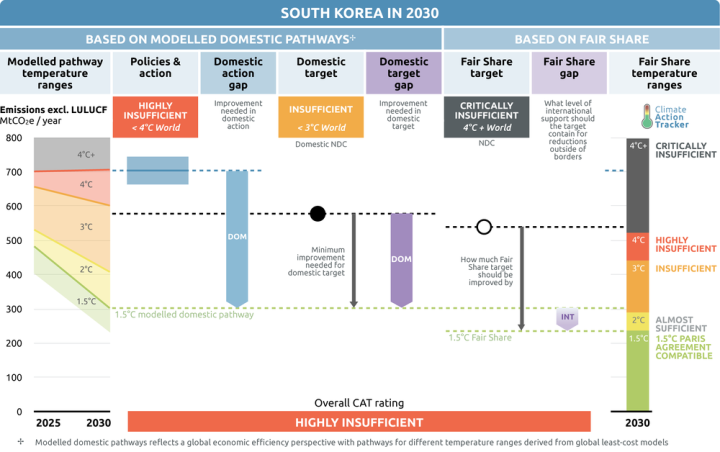Korea
Korea
Hydrogen battery car
Korean Target
South Korea submitted its updated NDC in December 2020. Compared to its previous submission, South Korea has now put forward an absolute mitigation target instead of a reduction compared to a business as usual (BAU) scenario. Because the previous NDC provided this scenario in absolute terms, the previous NDC target was de facto also absolute. The updated NDC does not change the targeted 2030 emissions level in absolute terms and represents no enhancement of ambition.
The updated NDC aims for a reduction of 24.4% below 2017 levels by 2030, whereas the previous NDC set the goal of reducing business-as-usual emissions by 37% by 2030. These two targets both lead to an emissions level of 540 MtCO2e by 2030 (see assumptions section). This is 81% above 1990 emissions and 19% below 2010 emissions.
In October 2020, President Moon Jae-in announced South Korea’s commitment to achieving carbon neutrality by 2050. The updated NDC notes that the government will analyse various scenarios that lead to carbon neutrality by 2050, and further emissions reduction potential for 2030. Based on these analyses, South Korea may raise the NDC’s ambition level in the next few years.
The Renewable Portfolio Standard (RPS), which replaced a previous feed-in tariff scheme and has been in place since 2012, is the main policy instrument to promote renewable energy. The RPS scheme requires major electric utilities to increase their renewable and “new energy” share in the electricity mix to 10% by 2023 (Korea New and Renewable Energy Center, 2019). Our current policies scenario projections on renewable electricity are modest partly due to this unambitious RPS.
In the transport sector, the number of annual electric vehicles (EVs) sales doubled from 2017 to 2018 to 33,000, accounting for over 2% of total new car sales in 2018 (IEA, 2019b). The South Korean Government is pushing the uptake of EVs through subsidies and tax rebates (IEA, 2019b), with the goal of having 430,000 EVs on the road by 2022. The government is also investing in a programme to improve charging infrastructure.
On 14 July 2020 President Moon Jae-In announced a “New Deal” to the tune of KRW 160 trillion (USD 130 billion; including private and local government spending) (Cheong Wa Dae, 2020). The announced New Deal contained a KRW 42.7 trillion (USD 35 billion) plan to boost renewable energy deployment and low-carbon infrastructure, including support to put 1.13 million electric vehicles and 200,000 hydrogen vehicles on the roads by 2025 (Shin and Cha, 2020).

